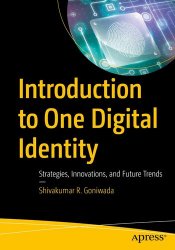 Название: Introduction to One Digital Identity: Strategies, Innovations, and Future Trends
Название: Introduction to One Digital Identity: Strategies, Innovations, and Future TrendsАвтор: Shivakumar R. Goniwada
Издательство: Apress
Год: 2024
Страниц: 253
Язык: английский
Формат: pdf, epub
Размер: 10.1 MB
Explore the dynamics of digital identity, a crucial component in today’s modern technology-driven era. This engaging book offers a deep understanding of how digital identity is evolving rapidly, why it’s so significant, and offers organizations, regulatory bodies, and academicians the strategies needed to adopt secure decentralized digital identity features effectively. It’s a must-read for those aiming to grasp the intricacies of digital identity and leverage it for future innovation and security.
The book begins by redefining digital identity, examining its evolution and the profound impact it has on both individuals and organizations. It then delves into the development of digital identity strategies, laying the foundation for future digital transformations. Covering a wide range of topics, the book discusses the innovation, challenges, and technological exploration in digital identity. A special focus is given to biometric technologies and the implementation of decentralized digital identities, addressing critical areas such as identity governance, blockchain, AI and advanced biometrics. The book also investigates the implications of digital identity across various industries, including cross border travel, healthcare, social media, finance, metaverse, IoT etc. finally the book provides not only emerging trends but offers a glimpse into the future digital identity.
An AI-powered identity is not an actual authentication mechanism, but it protects user identities from fraud and theft by using AI algorithms. Unlike the present cybersecurity measures, this guardian continuously learns about and acts on any new emerging threats and users’ behaviors and provides dynamic defense mechanisms. You can use this type of identity for personal use or for an entire enterprise. These guardians operate through an AI technique with cybersecurity protocols (access control, authentication, information protection, and automated monitoring). The guardians continuously analyze user data and activities in real time by using ML models. ML models enable the guardians to process and identify patterns from complex datasets, such login behaviors, biometric input, network access points, and phishing attempts. When guardians identify an anomaly or potential threat, they take immediate action such alerting the user, blocking access, etc. The neural network helps guardians to analyze the user behavior by training on the user’s past behaviors, such as login time, device usage pattern, behavior, etc.
Biometric identification based on human aesthetics introduces a unique approach to personal recognition by examining an individual’s distinct aesthetic look rather than psychological traits. This is an emerging field of research that explores the possibility of using individual’s aesthetic preferences to verify their identity. The aesthetic preferences are influenced by a variety of factors such as culture, personal experience, genes, etc. Researchers have found aesthetic preferences are relatively stable over time and can be used to identify individuals with good accuracy rates. Biometric patterns such as iris, fingerprint, and voice waveform all are unique to each other.
Iris patterns are made up of complex colors and texture. They are formed during fetal development and remain relatively stable throughout an individual’s life. No two individuals have exactly the same iris pattern. The art of the iris pattern lies in the intricate details and symmetry.
Fingerprints are also formed during fetal development and remain relatively stable throughout an individual’s life. This pattern is also very complex, and no two individuals have exactly the same pattern. The art of the fingerprint is made up of textures and swirling ridges and valleys.
Voice waveforms are sound waves that are produced by human voice and are formed by the vibrations of the vocal cords and the resonating chambers of the head and throat. These patterns are sometimes mimicked, however, and AI algorithms can possibly generate similar waveforms with the same pitch, tones, and timbres. The technology needs to evolve to master identifying unique waveforms.
The process in both physiological and behavioral biometric tools involves converting these captured details into digital formats and employing algorithms to encode templates. When an individual attempts to access a biometrically secured system, a real-time scan is conducted and compared to the stored template by using Artificial Intelligence (AI) and Machine Learning (ML) algorithms.
Whether you’re a tech professional, business leader, student or simply keen on understanding the impact of digital advancements, this book promises to offer insightful perspectives and practical solutions for navigating the complex world of digital identity. It underscores the importance of identity in spearheading digital innovation, making it a key resource for anyone looking to stay ahead in the digital landscape. As you reach its conclusion, you’ll be equipped with a wealth of knowledge and insights that are crucial in today’s digital era.
What You'll Learn:
Digital identity strategies and their role in shaping the future of digital identity
Different facets of digital identity
Specifics of biometric technologies and decentralized digital identity
Industry specific digital identity and its implementation
Crucial aspects of privacy, ethics, and secure in the context of digital identity
Who This Book Is For:
Software professionals, security practitioners, architects, senior managers, executives, and students who are interested in digital identity.
Скачать Introduction to One Digital Identity: Strategies, Innovations, and Future Trends